29th April 2011 - New research
NEW CLINICAL TRIAL OF COGANE FOR PARKINSON'S
DISEASE
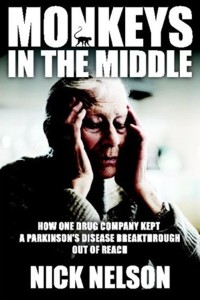 Cogane,
which can be taken orally, readily crosses the blood-brain barrier and has been
shown to stimulate the release of GDNF. For more details see the
Complete abstract.
In theory, GDNF
could biochemically increase somebody's ability to produce their own dopamine.
However, an animal study showed that this effect would reverse over time. GDNF
was the subject of the controversial Amgen trial, which claimed to rid some
people of Parkinson's Disease. Cogane
has been claimed to reduce the effects of Parkinson's Disease. However, the
study was only carried out on animals, who did not actually have Parkinson's
Disease. The study did not measure the long term effects, and the full details
of the clinical trial have not been made available
for analysis.
Cogane,
which can be taken orally, readily crosses the blood-brain barrier and has been
shown to stimulate the release of GDNF. For more details see the
Complete abstract.
In theory, GDNF
could biochemically increase somebody's ability to produce their own dopamine.
However, an animal study showed that this effect would reverse over time. GDNF
was the subject of the controversial Amgen trial, which claimed to rid some
people of Parkinson's Disease. Cogane
has been claimed to reduce the effects of Parkinson's Disease. However, the
study was only carried out on animals, who did not actually have Parkinson's
Disease. The study did not measure the long term effects, and the full details
of the clinical trial have not been made available
for analysis.
Studies evaluated Cogane in
healthy adults and people with Parkinson�s Disease. Cogane was shown to be safe
and generally well tolerated over the 28-day study period. For more information
go to
Cogane. A new longer clinical trial is being
arranged to assess whether Cogane works
(whether it can improve symptoms or prevent them from worsening), is safe and
well tolerated in people with early-stage Parkinson�s Disease, and to determine
how the body deals with Cogane. For more
information go to
PDTrials.
In order to refer to this article on its own
click here.
27th April 2011 - New research
INTESTINAL BACTERIA IS HIGHLY PREVALENT IN
PARKINSON'S DISEASE
Movement Disorders [2011] 26 (5) : 889-892 (Gabrielli M, Bonazzi P, Scarpellini
E, Bendia E, Lauritano EC, Fasano A, Ceravolo MG, Capecci M, Rita Bentivoglio A,
Provinciali L, Tonali PA, Gasbarrini A.)
Complete abstract
 Small
intestinal bacterial overgrowth has been found to be highly prevalent in
Parkinson's Disease. Parkinson's Disease is associated with gastrointestinal
motility abnormalities that could favour the occurrence of small intestinal
bacterial overgrowth. The aim of this study was to assess the prevalence of
small intestinal bacterial overgrowth in people with Parkinson's Disease. The
prevalence of small intestinal bacterial overgrowth was far higher in people
with Parkinson's Disease. It occurred in over half (54%) of all people with
Parkinson's Disease, in contrast to only 8% of people that do not have
Parkinson's Disease. The severity of Parkinson's Disease was also very
significantly related to small intestinal bacterial overgrowth.
Small
intestinal bacterial overgrowth has been found to be highly prevalent in
Parkinson's Disease. Parkinson's Disease is associated with gastrointestinal
motility abnormalities that could favour the occurrence of small intestinal
bacterial overgrowth. The aim of this study was to assess the prevalence of
small intestinal bacterial overgrowth in people with Parkinson's Disease. The
prevalence of small intestinal bacterial overgrowth was far higher in people
with Parkinson's Disease. It occurred in over half (54%) of all people with
Parkinson's Disease, in contrast to only 8% of people that do not have
Parkinson's Disease. The severity of Parkinson's Disease was also very
significantly related to small intestinal bacterial overgrowth.
This
can lead to the following symptoms : excess gas,
abdominal bloating and distension, abdominal pain,
and diarrhea or in some cases chronic constipation. For more information go to
Small
intestinal bacterial overgrowth. The researchers suggest that the
gastrointestinal motility abnormalities that often occur in Parkinson's Disease
might explain this association. In order to refer to this article on its own
click here.
23rd April
2011 - New book
SWALLOW SAFELY - HOW SWALLOWING PROBLEMS
THREATEN THE ELDERLY AND OTHERS
Roya Sayadi, Joel Herskowitz
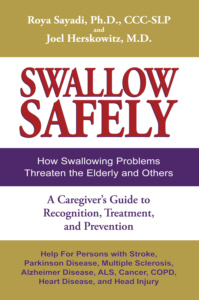 Publisher's
description : "Swallow Safely" is "A Caregiver's Guide to Recognition,
Treatment, and Prevention". Relatively few people realize the danger of
swallowing problems. They take tens of thousands of lives every year through
choking, pneumonia, and malnutrition. "Swallow Safely" seeks to erase this
knowledge gap. The book presents in clear, non-technical language with
illustrations how swallowing works normally, how things can go wrong, what
symptoms to watch out for, and how to get help. The book is written primarily
for caregivers of elderly persons and others with medical and neurologic
problems such as Parkinson disease, which is commonly associated with swallowing
problems.
Click here for more details. For the book's web site go to
Swallow Safely.
For
more books concerning Parkinson's Disease go to
Parkinson's Disease Books.
Publisher's
description : "Swallow Safely" is "A Caregiver's Guide to Recognition,
Treatment, and Prevention". Relatively few people realize the danger of
swallowing problems. They take tens of thousands of lives every year through
choking, pneumonia, and malnutrition. "Swallow Safely" seeks to erase this
knowledge gap. The book presents in clear, non-technical language with
illustrations how swallowing works normally, how things can go wrong, what
symptoms to watch out for, and how to get help. The book is written primarily
for caregivers of elderly persons and others with medical and neurologic
problems such as Parkinson disease, which is commonly associated with swallowing
problems.
Click here for more details. For the book's web site go to
Swallow Safely.
For
more books concerning Parkinson's Disease go to
Parkinson's Disease Books.
21st April 2011 - New research
IRON IS ASSOCIATED WITH REDUCED PARKINSON'S
DISEASE
The
Journal of Neurological Science [2011] Apr 15. [Epub ahead of print]
(Miyake Y, Tanaka K, Fukushima W, Sasaki S, Kiyohara C, Tsuboi Y, Yamada T, Oeda
T, Miki T, Kawamura N, Sakae N, Fukuyama H, Hirota Y, Nagai M)
Complete abstract
In some people, metals such as iron and zinc have been claimed to be increased
in the substantia nigra, which is the part of the brain most involved in
Parkinson's Disease. Copper is sometimes decreased in the same part of the
brain. It has consequently often been claimed that iron may contribute to
Parkinson's Disease. However, instead of being a toxic substance, iron is a
nutrient required for normal function in the brain. Iron is essential for the
formation of L-dopa, whose deficiency causes Parkinson's Disease. So its
deficiency rather than excess would be likely to cause
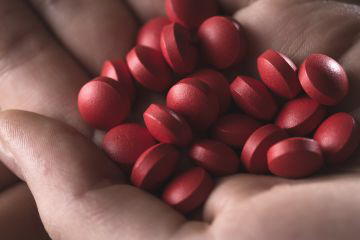 Parkinson's
Disease. Evidence for the association of the dietary intake of metals with the
risk of Parkinson's Disease is limited. So researchers investigated the
relationship between metal consumption and the risk of Parkinson's Disease using
a self administered dietary questionnaire. Instead of causing Parkinson's
Disease, higher intake of iron, magnesium, and zinc was actually associated with
a reduced risk of Parkinson's Disease. The lowest risk of Parkinson's Disease
was associated with increased intake of iron, then magnesium, then zinc. There
were no relationships between the intake of copper or manganese and the risk of
Parkinson's Disease. In order to refer to this article on its own
click here.
Parkinson's
Disease. Evidence for the association of the dietary intake of metals with the
risk of Parkinson's Disease is limited. So researchers investigated the
relationship between metal consumption and the risk of Parkinson's Disease using
a self administered dietary questionnaire. Instead of causing Parkinson's
Disease, higher intake of iron, magnesium, and zinc was actually associated with
a reduced risk of Parkinson's Disease. The lowest risk of Parkinson's Disease
was associated with increased intake of iron, then magnesium, then zinc. There
were no relationships between the intake of copper or manganese and the risk of
Parkinson's Disease. In order to refer to this article on its own
click here.
19th April 2011 - New research
CHANGING FROM L-DOPA TO MELEVODOPA
Minerva
Medica [2011] 102 (2) : 125-132 (Bosco D, Plastino M, Bosco F, Fava A, Rotondo
A)
Complete abstract
The aim of the present study was to evaluate the use in advanced Parkinson's
Disease of Melevodopa, which is undergoing testing. Continuous intravenous
infusions of L-Dopa as a treatment for Parkinson's Disease are limited by the
insolubility and acidity of L-Dopa. Melevodopa, which is a methyl ester of
L-dopa, overcomes this as it is a soluble neutral derivative. In previous
studies Melevodopa led to a significantly more rapid reversal of "off" periods,
and reduction in "off" time, and
more
readily led to "on" periods.
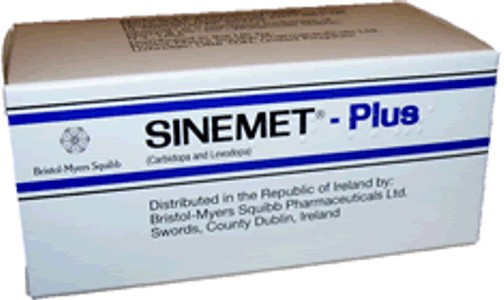 In the present study, when people were switched
from Sinemet to Melevodopa people improved regarding their "On-time". The
benefit was greater in people with "delayed-on", and especially in those with
both "delayed-on" and "wearing-off". Most patients showed a significant
improvement in PDQ-39 total score (a standard Parkinson's Disease symptom
questionnaire). The authors conclude that Melevodopa is an effective agent for
improving motor performance and quality-of-life in Parkinson's Disease with
"delayed-on" and with "wearing-off". In order to refer to
this article on its own
click here.
In the present study, when people were switched
from Sinemet to Melevodopa people improved regarding their "On-time". The
benefit was greater in people with "delayed-on", and especially in those with
both "delayed-on" and "wearing-off". Most patients showed a significant
improvement in PDQ-39 total score (a standard Parkinson's Disease symptom
questionnaire). The authors conclude that Melevodopa is an effective agent for
improving motor performance and quality-of-life in Parkinson's Disease with
"delayed-on" and with "wearing-off". In order to refer to
this article on its own
click here.
16th April 2011 - New research
THE CONSENSUS ON DBS FOR PARKINSON'S DISEASE
Archives of Neurology [2011] 68 (2) : 165
(Bronstein JM, Tagliati M, Alterman RL, Lozano AM, Volkmann J, Stefani A, Horak
FB, Okun MS, Foote KD, Krack P, Pahwa R, Henderson JM, Hariz MI, Bakay RA, Rezai
A, Marks WJ Jr, Moro E, Vitek JL, Weaver FM, Gross RE, DeLong MR.)
Complete abstract
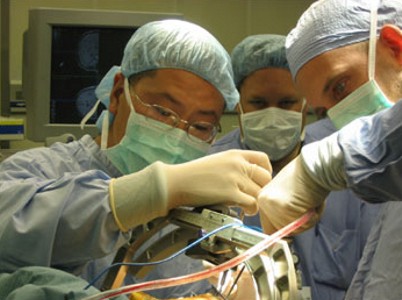 An
international consortium of experts organized, reviewed the literature
concerning DBS (Deep Brain Stimulation) for Parkinson's Disease in order to
provide recommendations to patients, physicians, and other health care
providers. Deep Brain Stimulation (DBS)
involves the use of electrodes that are implanted
into the brain and connected to a small electrical device called a pulse
generator that can be externally programmed. DBS can reduce the need for L-dopa
and related drugs, which in turn decreases the dyskinesias that are a common
side effect of L-dopa. It also helps to alleviate fluctuations of symptoms and
to reduce tremors, slowness of movements, and gait problems. For more
information go to
Deep brain stimulation.
An
international consortium of experts organized, reviewed the literature
concerning DBS (Deep Brain Stimulation) for Parkinson's Disease in order to
provide recommendations to patients, physicians, and other health care
providers. Deep Brain Stimulation (DBS)
involves the use of electrodes that are implanted
into the brain and connected to a small electrical device called a pulse
generator that can be externally programmed. DBS can reduce the need for L-dopa
and related drugs, which in turn decreases the dyskinesias that are a common
side effect of L-dopa. It also helps to alleviate fluctuations of symptoms and
to reduce tremors, slowness of movements, and gait problems. For more
information go to
Deep brain stimulation.
The following recommendations were agreed on by all
members : (1) Patients with Parkinson's Disease without significant active
cognitive or psychiatric problems who have medically intractable motor
fluctuations, intractable tremor, or intolerance of medication adverse effects
are good candidates for DBS. (2) DBS surgery is best performed by an experienced
neurosurgeon with expertise in stereotactic neurosurgery who is working as part
of a inter-professional team. (3) Surgical complication rates are extremely
variable, with infection being the most commonly reported complication of DBS.
(4) DBS programming is best accomplished by a highly trained clinician and can
take 3 to 6 months to obtain optimal results. (5) DBS improves L-dopa responsive
symptoms, dyskinesia, and tremor. Benefits seem to be long-lasting in many motor
domains. (6) Subthalamic nuclei DBS may be complicated by increased depression,
apathy, impulsivity, worsened verbal fluency, and executive dysfunction in some
patients. (7) Both globus pallidus pars interna and subthalamic nuclei DBS have
been shown to be effective in addressing the motor symptoms of Parkinson's
Disease. (8) Ablative therapy is still an effective alternative and should be
considered in a select group of appropriate patients.
In order to refer to this article on its own
click here.
14th April 2011 - New research
DO BOTH TWINS GET PARKINSON'S DISEASE
Neurobiology of Aging [2011] Apr 9. [Epub ahead of
print] (Wirdefeldt K, Gatz M, Reynolds CA, Prescott CA, Pedersen NL.)
Complete abstract
Previous twin studies reported no heritability of Parkinson's Disease. A Swedish
study, assessed nearly 500,000 people. Amongst them were over 500 twins with
Parkinson's Disease. The percentage of twins that both had Parkinson's Disease
was 11% for monozygotic twins (identical twins) and only 4% for same-sexed
dizygotic twins (twins that are not identical). When this was expanded to assess
the coincidence of Parkinson's Disease or Parkinsonism the percentage of twins
that both had Parkinson's Disease or Parkinsonism was 13% for monozygotic
 twins
(identical twins) and only 5% for same-sexed dizygotic twins (twins that are not
identical). The authors conclude that Parkinson's Disease is mildly heritable.
However, they do not appear to have taken account of the twins having the same
environment, dietary habits and medical treatments. These considerations could
possibly nullify the level of coincidence of Parkinson's Disease found amongst
twins, and thereby make the study consistent with previous studies suggesting a
lack of heritability in Parkinson's Disease.
In order to refer to this article on its own
click here.
twins
(identical twins) and only 5% for same-sexed dizygotic twins (twins that are not
identical). The authors conclude that Parkinson's Disease is mildly heritable.
However, they do not appear to have taken account of the twins having the same
environment, dietary habits and medical treatments. These considerations could
possibly nullify the level of coincidence of Parkinson's Disease found amongst
twins, and thereby make the study consistent with previous studies suggesting a
lack of heritability in Parkinson's Disease.
In order to refer to this article on its own
click here.
5th April 2011 - New research
JAPANESE AND CHINESE TEA REDUCE THE RISK OF
PARKINSON'S DISEASE
Parkinsonism Related Disorders [2011] Mar 30 [Epub
ahead of print] (Tanaka K, Miyake Y, Fukushima W, Sasaki S, Kiyohara C, Tsuboi
Y, Yamada T, Oeda T, Miki T, Kawamura N, Sakae N, Fukuyama H, Hirota Y, Nagai M)
Complete abstract
 Studies
that addressed the association between the intake of coffee or caffeine and
Parkinson's Disease were conducted mainly in Western countries. Little is known
about this relationship in an Asian population. Therefore, researchers assessed
the association of the intake of coffee, caffeine and also Japanese and Chinese
teas with the risk of Parkinson's Disease. Intake of coffee, black tea,
and Japanese and Chinese teas were significantly inversely associated with the
risk of Parkinson's Disease. They all reduced the risk of Parkinson's Disease by
nearly half. This is the first study to show a significant inverse relationship
between the intake of Japanese tea and Chinese tea (which are commonly
green
teas), and the risk of Parkinson's Disease.
In order to refer to this article on its own
click here.
Studies
that addressed the association between the intake of coffee or caffeine and
Parkinson's Disease were conducted mainly in Western countries. Little is known
about this relationship in an Asian population. Therefore, researchers assessed
the association of the intake of coffee, caffeine and also Japanese and Chinese
teas with the risk of Parkinson's Disease. Intake of coffee, black tea,
and Japanese and Chinese teas were significantly inversely associated with the
risk of Parkinson's Disease. They all reduced the risk of Parkinson's Disease by
nearly half. This is the first study to show a significant inverse relationship
between the intake of Japanese tea and Chinese tea (which are commonly
green
teas), and the risk of Parkinson's Disease.
In order to refer to this article on its own
click here.
.gif)
.gif)

 Small
intestinal bacterial overgrowth has been found to be highly prevalent in
Parkinson's Disease. Parkinson's Disease is associated with gastrointestinal
motility abnormalities that could favour the occurrence of small intestinal
bacterial overgrowth. The aim of this study was to assess the prevalence of
small intestinal bacterial overgrowth in people with Parkinson's Disease. The
prevalence of small intestinal bacterial overgrowth was far higher in people
with Parkinson's Disease. It occurred in over half (54%) of all people with
Parkinson's Disease, in contrast to only 8% of people that do not have
Parkinson's Disease. The severity of Parkinson's Disease was also very
significantly related to small intestinal bacterial overgrowth.
Small
intestinal bacterial overgrowth has been found to be highly prevalent in
Parkinson's Disease. Parkinson's Disease is associated with gastrointestinal
motility abnormalities that could favour the occurrence of small intestinal
bacterial overgrowth. The aim of this study was to assess the prevalence of
small intestinal bacterial overgrowth in people with Parkinson's Disease. The
prevalence of small intestinal bacterial overgrowth was far higher in people
with Parkinson's Disease. It occurred in over half (54%) of all people with
Parkinson's Disease, in contrast to only 8% of people that do not have
Parkinson's Disease. The severity of Parkinson's Disease was also very
significantly related to small intestinal bacterial overgrowth.  Publisher's
description : "Swallow Safely" is "A Caregiver's Guide to Recognition,
Treatment, and Prevention". Relatively few people realize the danger of
swallowing problems. They take tens of thousands of lives every year through
choking, pneumonia, and malnutrition. "Swallow Safely" seeks to erase this
knowledge gap. The book presents in clear, non-technical language with
illustrations how swallowing works normally, how things can go wrong, what
symptoms to watch out for, and how to get help. The book is written primarily
for caregivers of elderly persons and others with medical and neurologic
problems such as Parkinson disease, which is commonly associated with swallowing
problems.
Publisher's
description : "Swallow Safely" is "A Caregiver's Guide to Recognition,
Treatment, and Prevention". Relatively few people realize the danger of
swallowing problems. They take tens of thousands of lives every year through
choking, pneumonia, and malnutrition. "Swallow Safely" seeks to erase this
knowledge gap. The book presents in clear, non-technical language with
illustrations how swallowing works normally, how things can go wrong, what
symptoms to watch out for, and how to get help. The book is written primarily
for caregivers of elderly persons and others with medical and neurologic
problems such as Parkinson disease, which is commonly associated with swallowing
problems.
 Parkinson's
Disease. Evidence for the association of the dietary intake of metals with the
risk of Parkinson's Disease is limited. So researchers investigated the
relationship between metal consumption and the risk of Parkinson's Disease using
a self administered dietary questionnaire. Instead of causing Parkinson's
Disease, higher intake of iron, magnesium, and zinc was actually associated with
a reduced risk of Parkinson's Disease. The lowest risk of Parkinson's Disease
was associated with increased intake of iron, then magnesium, then zinc. There
were no relationships between the intake of copper or manganese and the risk of
Parkinson's Disease. In order to refer to this article on its own
Parkinson's
Disease. Evidence for the association of the dietary intake of metals with the
risk of Parkinson's Disease is limited. So researchers investigated the
relationship between metal consumption and the risk of Parkinson's Disease using
a self administered dietary questionnaire. Instead of causing Parkinson's
Disease, higher intake of iron, magnesium, and zinc was actually associated with
a reduced risk of Parkinson's Disease. The lowest risk of Parkinson's Disease
was associated with increased intake of iron, then magnesium, then zinc. There
were no relationships between the intake of copper or manganese and the risk of
Parkinson's Disease. In order to refer to this article on its own
 In the present study, when people were switched
from Sinemet to Melevodopa people improved regarding their "On-time". The
benefit was greater in people with "delayed-on", and especially in those with
both "delayed-on" and "wearing-off". Most patients showed a significant
improvement in PDQ-39 total score (a standard Parkinson's Disease symptom
questionnaire). The authors conclude that Melevodopa is an effective agent for
improving motor performance and quality-of-life in Parkinson's Disease with
"delayed-on" and with "wearing-off". In order to refer to
this article on its own
In the present study, when people were switched
from Sinemet to Melevodopa people improved regarding their "On-time". The
benefit was greater in people with "delayed-on", and especially in those with
both "delayed-on" and "wearing-off". Most patients showed a significant
improvement in PDQ-39 total score (a standard Parkinson's Disease symptom
questionnaire). The authors conclude that Melevodopa is an effective agent for
improving motor performance and quality-of-life in Parkinson's Disease with
"delayed-on" and with "wearing-off". In order to refer to
this article on its own
 An
international consortium of experts organized, reviewed the literature
concerning DBS (Deep Brain Stimulation) for Parkinson's Disease in order to
provide recommendations to patients, physicians, and other health care
providers. Deep Brain Stimulation (DBS)
An
international consortium of experts organized, reviewed the literature
concerning DBS (Deep Brain Stimulation) for Parkinson's Disease in order to
provide recommendations to patients, physicians, and other health care
providers. Deep Brain Stimulation (DBS)
 twins
(identical twins) and only 5% for same-sexed dizygotic twins (twins that are not
identical). The authors conclude that Parkinson's Disease is mildly heritable.
However, they do not appear to have taken account of the twins having the same
environment, dietary habits and medical treatments. These considerations could
possibly nullify the level of coincidence of Parkinson's Disease found amongst
twins, and thereby make the study consistent with previous studies suggesting a
lack of heritability in Parkinson's Disease.
In order to refer to this article on its own
twins
(identical twins) and only 5% for same-sexed dizygotic twins (twins that are not
identical). The authors conclude that Parkinson's Disease is mildly heritable.
However, they do not appear to have taken account of the twins having the same
environment, dietary habits and medical treatments. These considerations could
possibly nullify the level of coincidence of Parkinson's Disease found amongst
twins, and thereby make the study consistent with previous studies suggesting a
lack of heritability in Parkinson's Disease.
In order to refer to this article on its own
 Studies
that addressed the association between the intake of coffee or caffeine and
Parkinson's Disease were conducted mainly in Western countries. Little is known
about this relationship in an Asian population. Therefore, researchers assessed
the association of the intake of coffee, caffeine and also Japanese and Chinese
teas with the risk of Parkinson's Disease. Intake of coffee, black tea,
and Japanese and Chinese teas were significantly inversely associated with the
risk of Parkinson's Disease. They all reduced the risk of Parkinson's Disease by
nearly half. This is the first study to show a significant inverse relationship
between the intake of Japanese tea and Chinese tea (which are commonly
Studies
that addressed the association between the intake of coffee or caffeine and
Parkinson's Disease were conducted mainly in Western countries. Little is known
about this relationship in an Asian population. Therefore, researchers assessed
the association of the intake of coffee, caffeine and also Japanese and Chinese
teas with the risk of Parkinson's Disease. Intake of coffee, black tea,
and Japanese and Chinese teas were significantly inversely associated with the
risk of Parkinson's Disease. They all reduced the risk of Parkinson's Disease by
nearly half. This is the first study to show a significant inverse relationship
between the intake of Japanese tea and Chinese tea (which are commonly